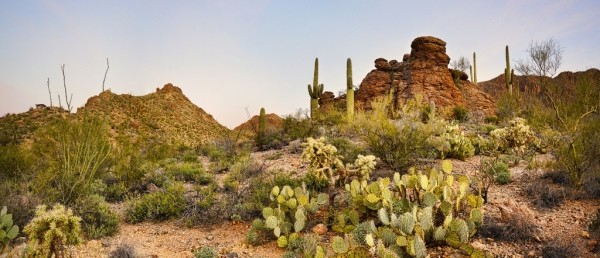
Groups Request ‘In Danger’ Status for El Pinacate Biosphere Reserve, Border Wall Threatens Protected Sonoran Desert Wildlife
PARIS—(ENEWSPF)–May 23, 2017. Conservation groups and representatives of the Tohono-O’odham of Sonora, Mexico today petitioned for “in danger” status for a World Heritage site in Mexico threatened by U.S. President Donald Trump’s border wall.
Today’s petition urges the UNESCO World Heritage Committee to find that the wall threatens the El Pinacate and Gran Desierto de Altar Biosphere Reserve on the U.S.-Mexico border. Trump’s proposed 30-foot “impenetrable” wall will block wildlife migration and threaten imperiled species that the 2,700-square mile reserve was designated to protect.
“Trump’s border wall is wrong for so many reasons,” said Sarah Uhlemann, international program director at the Center for Biological Diversity and author of the petition. “The proposed border wall will forever divide essential habitat for endangered Sonoran Desert wildlife, threatening both these animals and the incredible World Heritage Site designated to protect them.”
UNESCO designated the El Pinacate Reserve as a World Heritage property in 2013 in recognition of the area’s outstanding biodiversity, including desert wildlife that evolved over millions of years freely crossing the U.S.-Mexico border. The proposed border wall will block essential movement and migration, fragment habitat, and limit animals’ ability to search for food and water across the harsh Sonoran Desert.
Many of the threatened animals exist nowhere else on Earth. The endangered Sonoran pronghorn, the world’s second fastest land animal, has suffered severe declines with only around 975 animals existing today. Pronghorns require vast areas of open range to search for food, particularly in dry periods. They rarely jump even low fences, and the proposed 30-foot wall will present an impassable barrier. The wall would also harm endangered jaguars, bighorn sheep and even low-flying owls.
The wall will also harm the Tohono O’odham people who historically inhabited the El Pinacate and Gran Desierto de Altar Site and whose traditional lands are split by the U.S.-Mexico border. El Pinacate is sacred to the Tohono O’odham, and the site is regularly used for ceremonial purposes, including a sacred salt pilgrimage across the border to Mexico’s Gulf of California.
“Trump’s wall will completely uproot and permanently destroy our way of life, our himdag; what and who we are,” said Jose Martin Garcia Lewis, governor general of the O’odham in Sonora, Mexico. “It will deny our shared cultural and religious practice in the Pinacate: our Salt Ceremony and Pilgrimage, our collection of medicinal plants, visitation to burial sites and sacred cave sites, and plant life. It will, under international law, illegally sever our communications with and access to the Tohono O’odham Nation in Arizona.”
“We reject the idea of building a wall that separates the two nations and their peoples, and a wall’s impact on border ecosystems could be disastrous,” said Gustavo Ampugnani, executive director of Greenpeace México. “A wall would fragment habitat and limit the free movement of species like jaguar, affecting their genetic reproduction.”
Under the World Heritage Convention, a site may be listed as “in danger” if “development projects” or “major public works” threaten the natural values the site was designated to protect. An “in danger” designation will focus international attention on the El Pinacate Site and its habitat, as well as the ecological and cultural threats presented by Trump’s controversial border wall.
The Center for Biological Diversity is a national, nonprofit conservation organization with more than 1.3 million members and online activists dedicated to the protection of endangered species and wild places.
El Tribu de los O’odham en Sonora (“The O’odham Tribe in Sonora”) are transnational indigenous peoples, most of whom are legal members of the Tohono O’odham Nation; are related by blood to families in the Tohono O’odham Nation; and share one and the same culture and historical traditional territory with members of the Tohono O’odham Nation.
Greenpeace is the leading independent campaigning organization that uses peaceful direct action and creative communication to expose global environmental problems and to promote solutions that are essential to a green and peaceful future. For more information, visit www.greenpeace.org.
Source: http://biologicaldiversity.org








